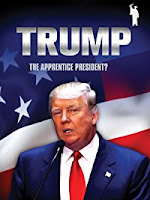Nutty Jason Kenney, A History: Part 2
We all like to figure out how other people tick. That's what makes gossip so popular. It confirms or changes our impressions of other people and we come up with responses like, "Typical" or "You wouldn't believe what he did last night." And, if we can't figure people out, we become suspicious of them.
Politicians are no different. In order to feel comfortable with them, we have to be able to understand them. Americans got to know Donald Trump on fourteen seasons of "The Apprentice." Even if they didn't get to know the real guy, they got to know a pretty well established persona. By the time he hit the campaign trail, he knew his audience and they knew or at least thought they knew the Donald.
It's not any different for Canadian audiences. Albertans loved Ralph Klein as the guy you could go out with for a beer. Even when he fucked up, he'd apologize and nearly everyone would forgive him. Like the time he walked into the homeless shelter and yelled at the residents to get a job and threw money at their feet. Later, he admitted to a drinking problem and Albertans forgave him. We understood the guy.
I think most Albertans understand Rachel Notley. Her father, Grant, served as leader of the NDP in the legislature from 1971 until his tragic death in a plane crash in 1984. Rachel was born in Edmonton, trained as a lawyer, practiced labour law before being elected to the legislature as a member of the NDP in 2008. It's no surprise she’d support some form of democratic socialism that protects the worker and the less fortunate.
It's not any different for Canadian audiences. Albertans loved Ralph Klein as the guy you could go out with for a beer. Even when he fucked up, he'd apologize and nearly everyone would forgive him. Like the time he walked into the homeless shelter and yelled at the residents to get a job and threw money at their feet. Later, he admitted to a drinking problem and Albertans forgave him. We understood the guy.
 |
| Grant Notley & family |
I think most Albertans understand Rachel Notley. Her father, Grant, served as leader of the NDP in the legislature from 1971 until his tragic death in a plane crash in 1984. Rachel was born in Edmonton, trained as a lawyer, practiced labour law before being elected to the legislature as a member of the NDP in 2008. It's no surprise she’d support some form of democratic socialism that protects the worker and the less fortunate.
Stephen Harper's father was an accountant. He grew up in Toronto, moved
to Edmonton, earned a Master’s Degree in Economics from the University of
Calgary in 1991. He worked as policy
chief for the Reform party before being elected to parliament in 1993. As a policy wonk trained in economics, he eventually became leader of the Conservative Party and Prime Minister of Canada. Maybe not the most likeable guy but a guy most Canadians could understand.
 |
| Justin under the arm of his father |
 |
| Wilcox, Sask. |
As a result, Jason redirected his energy from religion to politics, "not qua [for the sake of] politics but…as a promotion of the message of the gospel of life.” And his anger and limited world view provided an energy and focus that would serve him in his new life.
Jason began his new calling as an assistant to Ralph Goodale who was leader of the Liberal Party of Saskatchewan and the only member from
that party in the province’s legislature. Unfortunately, Ralph lost his seat in
the next election which caused Jason to pronounce that, “to be a Liberal on the
prairies in the 1980s was a contrarian position.”
So, he moved to
Calgary to become executive director of the Association
of Alberta Taxpayers and became renowned for 16-hour work days. He confronted Ralph Klein in the halls of the Alberta legislature regarding what he called a "gold plated" pension for MLAs. According to Jason, Ralph invited him out for a beer. Now, Jason likes to compare himself to Ralph however I cannot think of two individuals more different.
After one year in Alberta, Jason moved to Ottawa to become president of the Canadian Taxpayers Federation. He impressed Reform Leader Preston Manning when he placed 242 pink pigs on parliament hill as a protest against MP pensions. Preston encouraged him to run as a Reform candidate which he did. He ran for the riding of Calgary Southeast in 1997 and won.
After one year in Alberta, Jason moved to Ottawa to become president of the Canadian Taxpayers Federation. He impressed Reform Leader Preston Manning when he placed 242 pink pigs on parliament hill as a protest against MP pensions. Preston encouraged him to run as a Reform candidate which he did. He ran for the riding of Calgary Southeast in 1997 and won.
The
Reform Party became the Canadian Alliance Party in 2000 and then united with
the PC Party in 2003 to create the Conservative Party of Canada. In 2004, Stephen Harper
was elected to lead a very divided Conservative Party, one part economically
conservative, the other socially conservative.
Because the social conservatives didn’t trust him, Mr. Harper needed someone to mend the divide. To accomplish that task, he chose Jason. As past president of both the Alberta and Canadian Taxpayers Association, his credentials as a fiscal conservative were bonafide. As a social conservative, Ted Byfield of the Alberta Report would vouch that Jason was a true protector of social conservatism and not a “nice-guy Christian."
Because the social conservatives didn’t trust him, Mr. Harper needed someone to mend the divide. To accomplish that task, he chose Jason. As past president of both the Alberta and Canadian Taxpayers Association, his credentials as a fiscal conservative were bonafide. As a social conservative, Ted Byfield of the Alberta Report would vouch that Jason was a true protector of social conservatism and not a “nice-guy Christian."
 |
| Jason with a "visible minority." |
Nevertheless, the guy who'd attended St. Ignatius Institute 20 years previously hadn’t suddenly disappeared and become filled with tolerance and compassion. As part of a newly elected majority government, Jason froze applications from parents and grandparents of children living in Canada unless those children could afford to buy a year’s worth of health insurance. Suffice it to say, many could not. Then he blockaded two freighters with Tamils escaping a bloody civil war in Sri Lanka. These people were herded into detention centres in the Fraser Valley where they were interrogated as potential terrorists.
 |
| Jobbik paramilitary |
Jason preferred
the idea of granting 400,000 temporary work visas to provide employers with
indentured workers. It was supposed to be a program for employers who couldn’t
find Canadians to fill job vacancies. However, it ran into trouble when news got out
that the Royal Bank was laying off staff to make room for Indian foreign
workers at a cost savings of 15%. Jason had to backtrack killing the 15% wage differential
for temporary workers and requiring employers to try harder to hire Canadians.
In 2011, Jason introduced a bill banning
candidates from wearing face coverings like niqabs while taking their
citizenship oaths. It became law but was later overturned by a Federal Court
after being challenged by Zunera Ishaq, a former high school teacher.
The ban became
a campaign issue in federal election in 2015. In response to Calgary mayor Naheed
Nenshi ‘s objection to the ban, Jason responded, “I don’t think this should be
an issue of contention” despite the fact that he’d earlier said that the niqab
“reflects a misogynistic view of women which is grounded in medieval tribal
culture.” Jason may mix well with the immigrant community however his tolerance and understanding may be somewhat lacking.
When the Conservatives lost the election and Stephen Harper resigned, many considered Jason
to be the leading candidate to replace him. However, Jason saw a purpose elsewhere.
Alberta had newly elected the NDP socialist menace in Alberta and he saw his
new mission in saving the province from this travesty. Politics were getting
ugly, just right for the self-described “attack dog” to play the role of saviour.
 |
| Rachel as golf ball target |
The Oilmen in Brooks used an enlarged photo of Ms. Notley’s face as a target at their annual golf tournament June of 2016. Misogynists on twitter posted their very best epithets against Ms. Notley calling her a “f—king bitch,” “an ugly whore,” “a twat”, a “no-good stupid piece of sh—“, and my favourite, the “fricken devil I seen in my nightmares.” Worst though, have been the death threats of which, I’ve included examples of a few.
Like any individual whose life has been spent in the realm of the religious and ideological, Jason's answers for Alberta's problems have come in the form of the ideological: lower corporate
taxes, bring back a flat-tax, decrease minimum wages, get rid of the carbon tax
and most of the environmental regulations, and drastically reduce government
spending.
In the movie, "Field of Dreams," a voice told Ray Kinsella that "If you build it, he will come." And so, Ray built a baseball field. When it was completed, Shoeless Joe and the members of the disgraced 1919 Chicago White Sox team appeared as if by magic through the corn field to play on Ray's field.
Likewise, a voice has told Jason and his followers that, if they return to a mythic conservative fiscal and social policy of Ralph Klein, good times will come again. The oil companies and their investment money will return and we'll all be rich again. I wonder if Jason envisions himself cutting a "prosperity bonus" just like his hero.
In the movie, "Field of Dreams," a voice told Ray Kinsella that "If you build it, he will come." And so, Ray built a baseball field. When it was completed, Shoeless Joe and the members of the disgraced 1919 Chicago White Sox team appeared as if by magic through the corn field to play on Ray's field.
Likewise, a voice has told Jason and his followers that, if they return to a mythic conservative fiscal and social policy of Ralph Klein, good times will come again. The oil companies and their investment money will return and we'll all be rich again. I wonder if Jason envisions himself cutting a "prosperity bonus" just like his hero.







Comments
Post a Comment